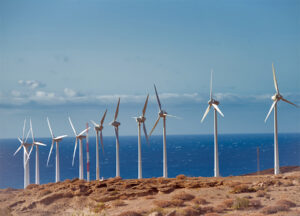The green-energy frontrunner powers forward to decarbonize Europe

Morocco acted as a pioneer in renewables to create one of the world’s most-competitive low-carbon platforms for industry. Now, its continuing investments in green electricity and hydrogen are turning it into a sustainable energy hub for Europe and Africa.
SHARE THIS ARTICLE:

In 2009, Morocco took its first steps on a pioneering journey to become a global frontrunner in renewable energy that has transformed it into a highly competitive low-carbon industrial platform. Today, 37 percent of Morocco’s energy capacity is green and, as a result, manufacturers in the country can access clean power easily, reliably and at one of the most competitive prices worldwide.
52 large-scale renewable projects have been implemented to date—mainly capitalizing on the country’s abundant wind, solar and hydro resources—giving a capacity of over 4 GW for an investment of around $5.4 billion, according to the Ministry of Energy Transition and Sustainable Development. A further 59 projects worth $5.5 billion are in development to add another 4.5 GW and many more are planned, with the government aiming to attract at least $30 billion in investments by 2030 as the country drives on with its ambition to increase the share of renewables in its power mix to 52 percent by 2030, 70 percent by 2040 and 80 percent by 2050.
Ranked first in Africa for green-energy investment opportunities in accountancy giant EY’s Renewable Energy Country Attractiveness Index, Morocco is already a magnet for global investors. For example, 2016’s construction of the groundbreaking Noor I plant—one of the world’s biggest solar facilities—was a joint venture between an international consortium led by Saudi Arabia’s ACWA Power and the Moroccan Agency for Sustainable Energies (Masen), a state-owned organization that leads development programs for integrated projects. While Africa’s largest wind farm, a 301-MW plant in Tarfaya, was developed and is operated by French multinational Engie and Moroccan electricity company Nareva Holding.
“We recognize Morocco’s comparative advantages: best-in-class solar and wind resources, a commitment to stability and ensuring fair investment opportunities, and its talented pool of renewables and construction experts.”
The biggest facility in development at the moment—the 800-MW Noor Midelt I hybrid solar-and-storage project—is being built and will be operated by France’s EDF Renewables, Abu Dhabi-based Masdar and independent power producer Green of Africa. The French firm has completed or is developing three major wind and solar projects in the kingdom so far, says Modest Kwapinski, CEO of EDF Renewables Morocco: “We continue to expand in Morocco, with a four-fold increase in the size of our team in recent years. We recognize Morocco’s comparative advantages: best-in-class solar and wind resources, a commitment to stability and ensuring fair investment opportunities, and its talented pool of renewables and construction experts.”
International firms are also involved in smaller-scale initiatives, such as the Morocco Solar Home Systems project, in which Masdar has been helping to provide more than 19,000 solar kits to over 1,000 rural villages as part of the country’s drive to raise national access to electricity from 99.4 percent to 100 percent.
Opportunities for investors are constantly opening: this April, for instance, Masen allocated 333 MW of capacity in the upcoming Noor II solar project to winning tender bidders that include Italy’s Enel, France’s Voltalia and Dubai-headquartered Amea Power. And in July, the agency invited proposals before November for yet another mega project: Noor Atlas, a 260-MW seven-site photovoltaic scheme.
Many international developers have established regional headquarters in the country. For example, “EDF Renewables has decided on Casablanca as the hub for our wider North and West African ambitions, ensuring our presence in the country for the long term, be it for domestic or regional projects,” states Kwapinski. Those developers form part of a wider, integrated ecosystem that has made Morocco a notable industrial center for the development, manufacturing and export of sustainable energy technologies—as evidenced by the fact that 40 percent of the parts used in the vast Noor I were locally sourced.
A newly emerging sector of huge potential for investors is hydrogen and ammonia. The International Renewable Energy Agency believes Morocco is one of five countries best placed to be global leaders in producing green hydrogen and its derivatives, and the government has reacted with agility in enacting strategies for that to be realized—both to further decarbonize the kingdom’s own industries and to create a new export sector. The largest development announced to date in this area is a $850-million project that will create over 180,000 metric tons a year of ammonia from locally produced green hydrogen. Known as HEVO Ammonia Morocco, the initiative is led by Ireland’s Fusion Fuel and Greece-based Consolidated Contractors Company.
Foreign governments such as Germany’s are supporting Morocco’s bid to be a hydrogen exporter as the shift from fossil fuels accelerates in response to supply shocks like 2022’s spike in European gas prices. That has also fueled surging interest in sourcing green electricity directly from the kingdom. Morocco already has electricity interconnections with Algeria, Egypt and Libya, two cables connect it to Spain, there are plans for a connection to the U.K., it is working with the European Union on a roadmap for green electricity exchange and a connection project with Portugal is in the pipeline. “Interconnection with Morocco is fundamental,” Portuguese Prime Minister Antonio Costa has said. “Morocco can supply Europe with solar energy in a consistent manner. This is a new niche of cooperation with Africa that we can and must develop to ensure energy security.”

